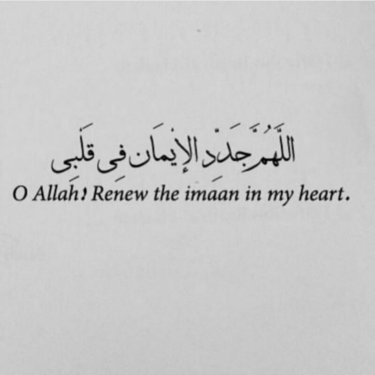-
Posts
1,761 -
Joined
-
Last visited
-
Days Won
106
Content Type
Profiles
Forums
Events
Everything posted by Bint e Aisha
-
-
"Don't join an easy crowd; you won't grow. Go where the expectations and the demands to perform are high."
- 36 replies
-
- inspiration
- motivation
-
(and 1 more)
Tagged with:
-
“He who keeps his heart near Allah will find peace and tranquility, while he who gives his heart to the people will find restlessness and apprehension.” Ibn Qayyim Al-Jawziyyah rahimahullah
-
-
If a heart becomes attached to anything other than Allah Ta’ala, Allah Ta’ala makes him dependant on what he is attached to. And he will be betrayed by it. – Ibn Jauzi رحمة الله عليه
-
-
-
بسم الله الرحمن الرحيم Tazkiyah-tun Nafs and Bay’ah Tazkiyah-tun Nafs (self-rectification) is Fardh (incumbent) upon each and every individual. It is possible to achieve Tazkiyah through seeking Ilm (knowledge) and more importantly, acting upon the Ilm provided it was obtained from reliable sources and teachers. Spiritual development under the auspicious supervision of a capable Shaykh (spiritual guide) will enable an individual to reach levels of spirituality which are not easily attainable independently. The most fundamental tenet in this path is the constant or prolonged company and supervision of a Shaykh. This can be achieved with or without Bay’ah. Therefore, taking bay’ah will be a Mustahab act. However, given that Bay’ah can be proven from Rasulullah Sallallahu Alayhi Wasallam and the Sahabah, taking Bay’ah will be a means of Barakah (blessings) and ease on this journey of Tazkiyah. Source : [Imdaadul Fatawa / Vol 5, Pg 246-247 and Imdaadul Ahkaam / Vol 1, Pg 48 of Moulana Ashraf Ali Thanvi Rahimahullah] Mufti Ebrahim Desai Darul Mahmood | darulmahmood.net
-
- 1
-

-
-
Part 5 of 5
-
Part 4 of 5
-
Part 3 of 5
-
Part 2 of 5
-
Maulana Abdul Sattar Sahab HA Part 1 of 5
-
Accepting Qadr
-
HADITH: WHATEVER YOUR HEART REJECTS, THEN ABANDON IT Question Nabi (sallallahu ‘alayhi wa sallam) struck the chest of the Sahabi and he said, “Whatever your heart rejects, then abandon it.” What is the source for this narration? Answer Imam ‘Abdullah Ibn Mubarak (rahimahullah) has recorded this narration (mursalan). The Hadith is suitable to quote and is supported by many similar narrations. The full narration is as follows: Abdur Rahman ibn Mu’awiyah (rahimahullah) reports: ” A man asked Nabi (sallallahu ‘alayhi wa sallam) thrice, “O Rasulullah! What is lawful and unlawful for me?” Nabi (sallallahu ‘alayhi wa sallam) kept silent and after the third time said, ‘Where is the questioner?’ When the questioner came forward, Nabi (sallallahu ‘alayhi wa sallam) said, “Whatever your heart rejects, then abandon it.” (Kitabuz Zuhd, Hadith: 1162. Also see Jami’ul ‘Ulumi Wal Hikam, under Hadith: 27) ‘Allamah Munawi (rahimahullah) explains that this only applies to those pure clean hearts which are trained to obey Allah and filled with his remembrance, so much so that the knowledge and light of Nubuwwah emanates from it, for only these types of hearts will be able to differentiate between right and wrong. (Faydul Qadir, Hadith: 7846) And Allah Ta’ala Knows best. Answered by: Moulana Suhail Motala Approved by: Moulana Muhammad Abasoomar Checked by: Moulana Haroon Abasoomar https://hadithanswers.com/hadith-whatever-your-heart-rejects-then-abandon-it/
-
SEEK A RULING FROM YOUR HEART Question Is this Hadith authentic? Sayyiduna Wabisah ibn Ma’bad (radiyallahu ‘anhu) said: “I came close to Rasulullah (sallallahu ‘alayhi wa sallam) until my knees touched his. He asked: ‘O Wabisah, should I inform you of what you came to ask or will you ask?’ I replied: ‘O Messenger of Allah, inform me.’ He said: ‘You came to ask me about righteousness and sin.’ I replied: ‘Yes.’ He combined three of his fingers and started to poke me with them in my chest and said, ‘O Wabisah, ask your heart, ask yourself.’ [He repeated it three times and then said:] ‘Righteousness is that which the heart feels at ease with and the soul is content with and sin is that which troubles the heart and causes doubts in the chest, even if people pass fatwa (of permissibility) for you and give you verdicts.” Answer Imam Ahmad (rahimahullah) and other Muhaddithun have recorded this narration. ‘Allamah Mundhiri (rahimahullah) has declared the chain sound (hasan). ‘Allamah Nawawi (rahimahullah) has also declared the Hadith sound (hasan). (Musnad Ahmad, vol. 4 pg. 228, Targhib, vol. 2 pg. 557 and Al Adhkar, Hadith: 1229. Also see Sahih Muslim, Hadith: 2553) In this Hadith, it is the hearts of the pious ones that are being referred to, not those hearts that are soaked in [and naturally inclined to] sin! Also see here And Allah Ta’ala Knows best. Answered by: Moulana Suhail Motala Approved by: Moulana Muhammad Abasoomar Checked by: Moulana Haroon Abasoomar https://hadithanswers.com/seek-a-ruling-from-your-heart/
-
CONSULT YOUR HEART Question استفت قلبك Can the above-mentioned Hadith be explained in its correct context, due to many people misusing this Hadith. Answer The full narration of this Hadith has been recorded by Imam Ahmad (rahimahullah) and others. (Musnad Ahmad, vol. 4 pg.228) Imam Nawawi (rahimahullah) has declared this Hadith as sound (hasan). It would also be understood to have been classified as sound (hasan) by Hafiz Ibn Hajar (rahimahullah), as per the principle in his book, Hidayatur Ruwah. (Al-Arba’in An-Nawawiyyah, Hadith: 27, Hidayatur Ruwah, Hadith: 2705; Also see: Ithafus Sadatil Muttaqin vol. 1 pg. 160) Translation Sayyiduna Wabisah ibn Ma’bad (radiyallahu ‘anhu) has reported: “I headed for [the gathering of] Rasulullah (sallallahu ‘alayhi wasallam) intending to not leave out a single thing regarding [both acts of] righteousness [obedience] and vice [sin] except that I’d ask him. [When I reached him, I found] There was a group of Muslims around him asking him questions thus, I began to step over them [in an attempt to reach the front, where Rasulullah -sallallahu ‘alayhi wasallam- was]. [As I was doing this] The people then said [rebukingly, in response to my action]: ‘O Wabisah! Get away from Rasulullah (sallallahu ‘alayhi wasallam)! [i.e Step aside!]’ I replied [in response]: Leave me be so that I can come nearer to him [referring to Rasulullah -sallallahu ‘alayhi wasallam-] for indeed he is the most beloved of mankind that I would draw nearer to! [i.e. Leave me be and allow me to meet the one I love most amongst all of mankind!] [Upon seeing what was transpiring,] Rasulullah (sallallahu ‘alayhi wasallam) said [about] two or three times: ‘Leave Wabisah! Come closer O Wabisah!’ I [i.e. Wabisah] then came closer until I sat right in front of him. Thereafter he said: ‘O Wabisah! Should I tell you or are you going to ask me? [i.e. should I reveal and inform you regarding what you came to ask me about or would you yourself like to ask me?] I replied: Nay, rather you inform me! Rasulullah (sallallahu ‘alayhi wasallam) said: ‘You came to inquire me about [both acts of] righteousness/obedience and sin. [Amazed, as this was a miracle] I concurred saying: ‘Yes!’ He [i.e. Rasulullah -sallallahu ‘alayhi wasallam-] then combined his fingers and began tracing [i.e. lightly scratching, circling, drawing, etc.] my chest with them [all the while] repeating three times: ‘O Wabisah! Consult [and seek the ruling from] your heart; Ask [and check] your [inner] conscious. Righteousness is that about which the soul [inner conscious] feels tranquil [i.e. that about which your mind and heart feel at ease] whilst vice is that which creates restlessness in the soul and wavers in the chest [i.e that which a person feels hesitant and troubled about] even though the people have given you [their] verdict [of permissibility] on it.’” Explanation All actions are split into three main categories: Those that are clearly permissible Those that are clearly impermissible Those, the permissibility or impermissibility of which are unclear (See Sahih Bukhari, Hadith: 52, and Sahih Muslim Hadith: 1599) Contained within the purport of the Hadith in question, there is proof to show that Allah Ta’ala has created each individual with the natural disposition of detecting and differentiating right from wrong. Not only has Allah Ta’ala created mankind with this natural characteristic, but He has also made it such that their natural design is to settle for and be inclined towards that which is right [as in doing so they are more comfortable and unperturbed]. It is through the influence of Shaytan and the succumbing-to of one’s own desires that this natural disposition becomes weaker and at times completely covered up, or even – May Allah Ta’ala protect us all – altered. There are many verses from the Quran and Hadiths that support this concept and reality. Nonetheless, there are certain times when a person, [despite having strong Iman, but] due to a lack of knowledge, will be unable to make the clear distinction between right and wrong. It is during such an occasion [i.e. in times of confusion], as understood from the Hadith in question, that the heart and soul are to be consulted. It is not a general principle that one can apply across the board for all deeds. For example, a person cannot simply commit a sin, such as drinking alcohol, and then argue that it is not sinful since his soul is at ease with it. It is also incumbent to note, that the Muhaddithun and Commentators of Hadith have mentioned further specifications attached to this principle [of seeking council from one’s heart and soul]. Ibn Rajab Al-Hambali (rahimahullah) has mentioned that this principle only applies in two specific scenarios where there is confusion: When a person whose heart has been filled with Iman finds himself at a standstill due to uneasiness and confusion regarding a certain issue and then hears a verdict [of permissibility] from someone else. Furthermore, the one who issued the verdict, despite seeming apparently qualified to do so, clearly gave it through mere conjecture or whilst being influenced by his desires [ultimately, the one who issued the verdict didn’t base his verdict on any valid shari’ proof]. In such a scenario, if a person still feels perturbed and uneasy, then he can, out of taking his own precautionary measures and due to his taqwa [piety], avoid indulging in that act [by acting on this Hadith and consulting his heart]. As for that scenario where the verdict passed was based on a valid Shari’ proof, then it will be incumbent to follow the verdict regardless of one’s feelings or inner conscious. For example, if one is informed on the concessions of Shari’ah like performing Qasar Salah whilst traveling, then even if he finds himself doubting or initially feeling uneasy about performing two rak’ahs instead of four, he will still have to do two. It will be incumbent upon him and no regard will be given to his inner conscious or feelings at that time. When a person whose heart has been filled with Iman finds himself at a standstill due to uneasiness and confusion regarding a certain issue where nothing has been explicitly recorded from Rasulullah (sallallahu ‘alayhi wasallam), the Sahabah, nor any ‘Alim of the past; furthermore, the person was unable to find a reputable ‘Alim [scholar] that he could refer to; rather there is no one to assist him, or perhaps the only ones available to assist him are people who merely answer through guesswork and assumptions [and at times are even known to be far too laxed in their Din, following their whims and desires], then at such a time he can consult his heart and soul to decide whether to proceed and indulge in that action or not. (Jamiu’l Ulumi Wal-Hikam, Hadith: 27) Hafiz ibn Hajar Al-Haytami (rahimahullah) has echoed similar sentiments as well in his commentary on Imam Nawawi’s Al-Arba’in (rahimahullah). (Al-Fathul Mubin, Hadith: 27) Other ‘Ulama and Muhaddithun such as Qadhi ‘Iyadh, Ibnul ‘Attar and Mulla ‘Ali Qari (rahimahumallah) have mentioned more or less that this principle applies to a person’s wara’ [high level of piety]. This means that when a person feels perturbed and uncomfortable about indulging in a certain action, due to being uncertain whether that action will result in sin or not, then they should retract from that action [by practising on the Hadith]; even if others [i.e. reliable ‘Ulama] have passed a verdict [in favor of it]. The difference between this and the first explanation given is that the one giving the verdict didn’t necessarily do so based on conjecture or in following his desires. An example of this would be when an issue of permissibility has been passed on a certain issue, like the consumption of previously presumed doubtful meat, or the permissibility of a particular seemingly doubtful transaction, etc. After a verdict of permissibility has been passed, one can indulge in the action; but if he still feels uneasy and doubtful, he can personally exercise precaution and leave it out. There is one condition however, and that is that the uneasiness present in the heart [at that time] is correct [and valid in its place]. On the contrary, if it is from the deceitful whispers [wasawis] of the soul, then no consideration will be given to it at all. This is similar to what has passed above, i.e if a person has a doubt or uneasiness about something already proven and well established in din, then he will not be allowed to abuse this principle and use it out of context. (Sharhul Arba’in An-Nawawiyyah of Ibnul ‘Attar, Hadith: 27, Mirqat, Hadith: 2774; Also see Mirqat, Hadith: 2773) To truly understand and sum up this explanation [pertaining to wara’], one should ponder well over the profound statement of ‘Allamah Qabbari (rahimahullah) where he said: المكروه عقبة بين العبد و الحرام، فمن استكثر من المكروه تطرق إلى الحرام، و المباح عقبة بينه و بين المكروه، فمن استكثر منه تطرق إلى المكروه “[That which is] Makruh [disliked in Din] is a pathway between a person and [that which is] Haram. Whoever then excessively indulges in [those things which are] Makruh will eventually seek his way into [those things that are] Haram.” And [that which is] Mubah [permissible, but not necessarily preferable] is a pathway between him and Makruh. Whoever then overindulges in [those things that are] Mubah will eventually seek his way into [those things which are] Makruh. (Fathul Bari, Hadith: 52) Note: This is merely an explanation regarding the authenticity and text of the aforementioned Hadith. Kindly refer to a Mufti/Darul Ifta for any queries regarding specific matters mentioned as examples within the explanation. Also see here and here. And Allah Ta’ala knows best Approved by: Moulana Muhammad Abasoomar, There are two types of people who usually abuse the meaning of this Hadith; a) People who are habitual with a particular sin, and thereby justify their sin with the fact that their [twisted] conscience is clear about it! b) People who are over cautious in righteous deeds to the extent that they begin to harm themselves due to the waswasah (whisperings of Shaytan or their souls) Both should desist from using the blessed Hadith of Rasulullah (sallallahu’alayhi wasallam) as justification for their inabilities! https://hadithanswers.com/consult-your-heart/
-
Sinner to Saint (Top Men) Imaam ‘Abdullah bin Mubaarak (rahimahullah) is a famous personality. He was not only a master in the fields of hadeeth and fiqh, but was also among the greatest saints of his time. ‘Abdullah bin Mubaarak (rahimahullah) was once asked as to what had motivated him to set out to acquire the knowledge of Deen. In reply, he narrated the following: I was a youngster who would drink intoxicating substances. I would love music, and I would greatly enjoy myself, indulging in these sins. Once, when the apples and other fruit had ripened, I called my friends to an orchard for a party. We ate and drank, until we had drunk so much that we became drunk and fell asleep. At the very end of the night, just before sehri time, I awoke and picked up a lute (musical instrument). I then began to play it while singing some words. However, I could not get the tune to sound the way I wanted. So, I continued to play it, over and over, while repeating the words, until to my absolute surprise, the lute began to speak, just as a person speaks, and recited the following verse of the Quraan Majeed: اَلَمْ یَاۡنِ لِلَّذِیۡنَ اٰمَنُوۡۤا اَنۡ تَخْشَعَ قُلُوۡبُہُمْ لِذِكْرِ اللہِ Has the time not come for the believers, that their hearts should become humble before the remembrance of Allah Ta‘ala. When I heard this, I exclaimed, “Definitely (it is time for me to repent), O my Lord!” I then broke the lute and spilled the wine, and Allah Ta‘ala blessed me, through His grace, to make true taubah. It was then that I began to acquire the knowledge of Deen and exert myself in ‘ibaadah. (Tarteebul Madaarik vol. 3, pg. 43) Lessons: 1. No matter how sinful we may be, there is always hope for us. Even if we are addicted to drugs, or involved in an illicit relationship, or are drinking, partying or gambling – Allah Ta‘ala is still prepared to forgive us and accept us into His love and mercy. All that we need is to turn to Him, cry over our sins and try our best to reform our lives. 2. Sometimes, we get a feeling in our heart and feel inspired to change our lives and give up our sins. For some people, it is when they have a close call with death, or a close friend or relative passes away. This feeling is actually an inspiration from Allah Ta‘ala and an invitation to turn towards Him. We must grab these opportunities with both hands as they may not come again. 3. When we want to give up sins and change our life, we must cut off all ties with those things that can pull us back into the sin. Hence, ‘Abdullah (rahimahullah) broke the lute and spilled the wine. Hence, if we want to stop an illicit relationship for instance, we must completely cut off all communication with the girl, tell our friends that we do not want to know or hear anything about her and even delete and block her number. Ibnuabbaas.co.za
-
Feeling shiver up the spine Question What does it mean if someone gets shivers up their spine? بسم الله الرحمن الرحیم Answer There could be a variety of reasons why a person gets shivers up their spine. If this occurs when a person is reciting the Qurʾān or listening to an Islamic lecture or when thinking about the hereafter, this is commendable as it is a result of the fear of Allah. We are advised to combine between Allah’s fear and hope in His mercy and compassion, thus, whilst a person should fear Allah, he should also have hope in His mercy, and this hope should increase as a person becomes elderly. If this feeling, however, occurs due to the fear of a person or fear of something, a person should constantly engage in the remembrance of Allah. Allah Almighty says in the Qurʾān (13:28) “Listen, the hearts find rest by the remembrance of Allah.” There also specific masnūn supplications for protection from various illnesses and calamities as well as protection from oppressors and tyrants. A very comprehensive supplication is transmitted by ʿAbdullāh ibn ʿUmar (d. 73/693, may Allah be pleased with him) who said, “The Prophet ﷺ would not abandon these words in the evening and the morning: اللَّهُمَّ إِنِّي أَسْأَلُكَ الْعَافِيَةَ فِي الدُّنْيَا وَالْآخِرَةِ، اللَّهُمَّ إِنِّي أَسْأَلُكَ الْعَفْوَ وَالْعَافِيَةَ فِي دِينِي وَدُنْيَايَ وَأَهْلِي وَمَالِي، اللَّهُمَّ اسْتُرْ عَوْرَاتِي وَآمِنْ رَوْعَاتِي، اللَّهُمَّ احْفَظْنِي مِنْ بَيْنِ يَدَيَّ، وَمِنْ خَلْفِي، وَعَنْ يَمِينِي، وَعَنْ شِمَالِي، وَمِنْ فَوْقِي، وَأَعُوذُ بِعَظَمَتِكَ أَنْ أُغْتَالَ مِنْ تَحْتِي ‘O Allah, I ask You for wellbeing in this world and the hereafter. O Allah, I ask You for forgiveness and wellbeing in my religious and worldly affairs, and my family and my wealth. O Allah, conceal my faults and keep me safe from my fears. O Allah, protect me from the front and from behind, and on my right and on my left and from above, and I seek refuge in Your greatness from receiving unexpected harm from beneath me.’” (Sunan Abī Dāwūd, 5074; Sunan Ibn Mājah, 3871). Allah knows best Yusuf Shabbir 30 Jumādā al-Ūlā 1441 / 25 January 2020 Approved by: Mufti Shabbir Ahmad and Mufti Muhammad Tahir
-
It can also be said that: "Blessed is the man who dies, but the good done by him survives." May Allah ta'ala make us amongst them.
-
'Uthmān bin 'Affān رضي الله عنه said: "Verily, Allāh only gave you the dunya so that you use it to seek the hereafter, and He did not give it to you so that you would incline towards it." Al-Bidāyah wa-Nihāyah (241/7)
-
View your life from your funeral, looking back at your life experiences, what have you accomplished? What would you have wanted to accomplish but didn't? What were the happy moments? What were the sad? What would you do again, and what you wouldn't?
-
It is not the strongest or the smartest or the fastest who always wins. It is the one who never give up.
- 36 replies
-
- inspiration
- motivation
-
(and 1 more)
Tagged with:








